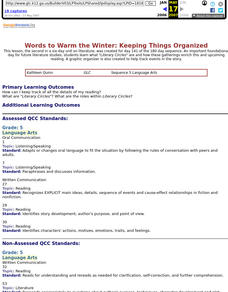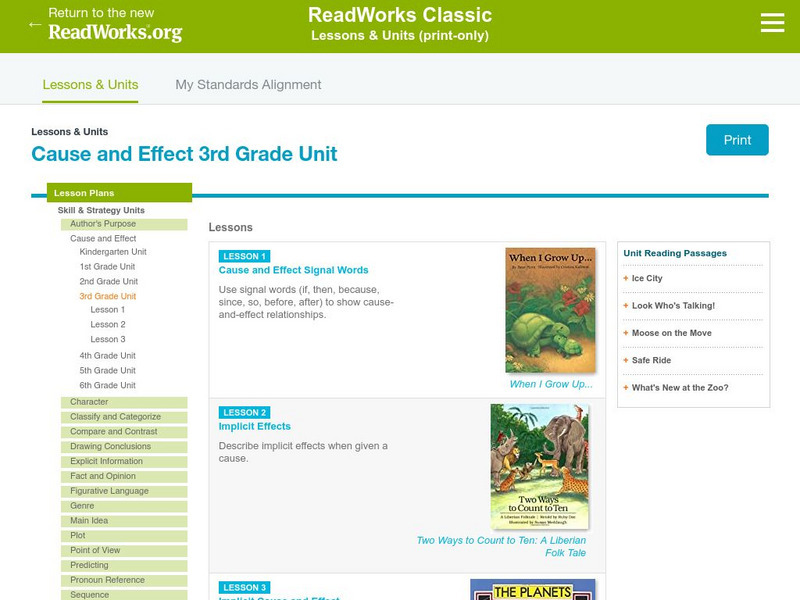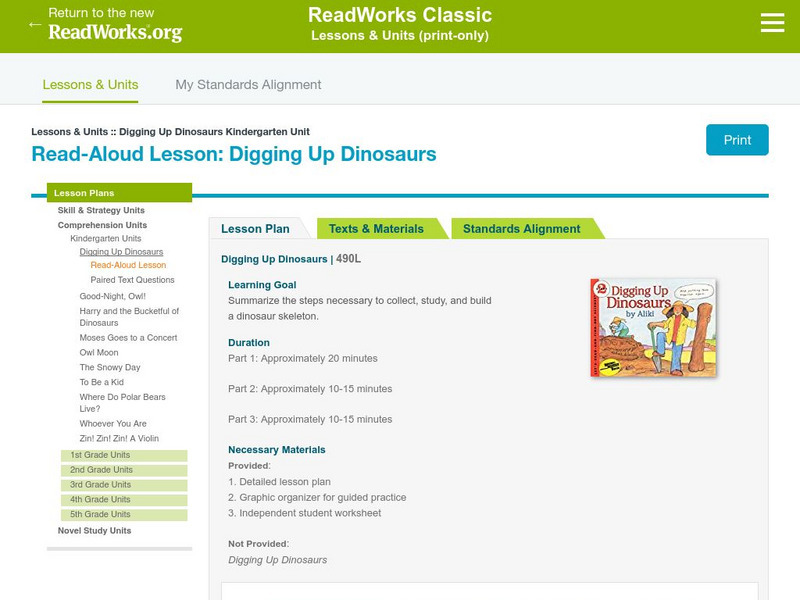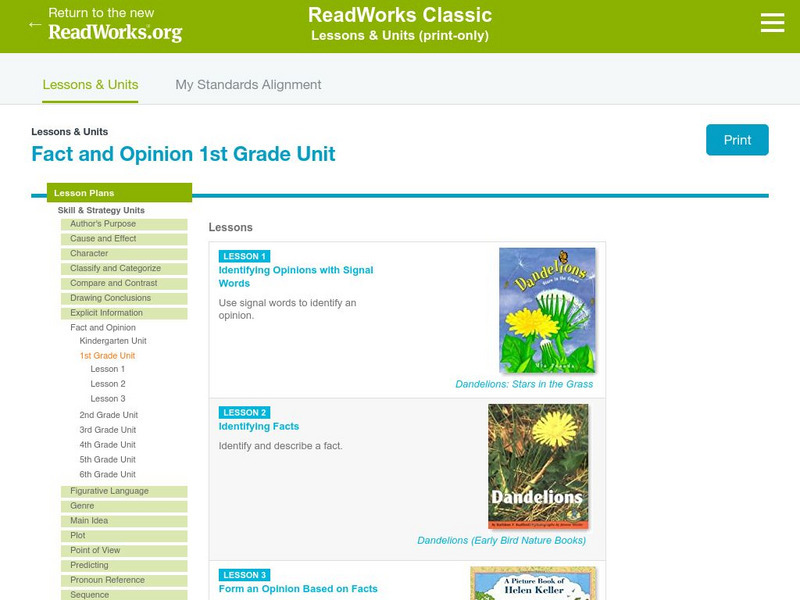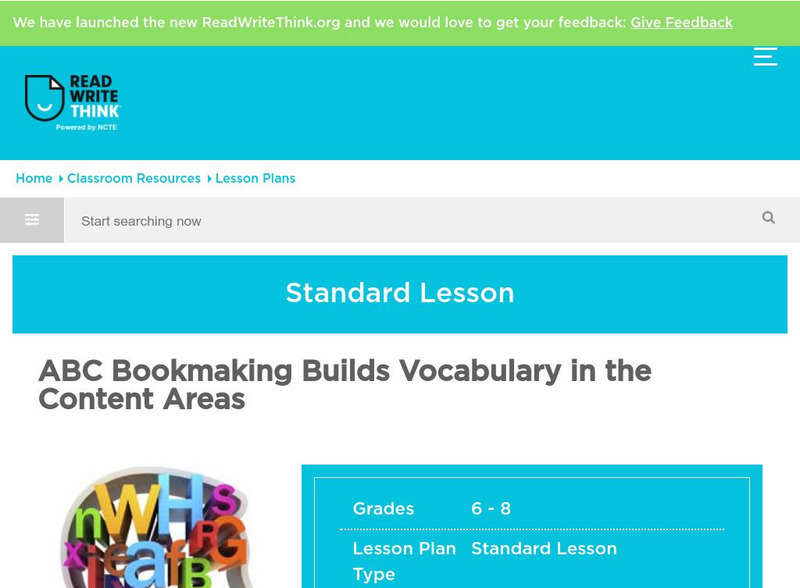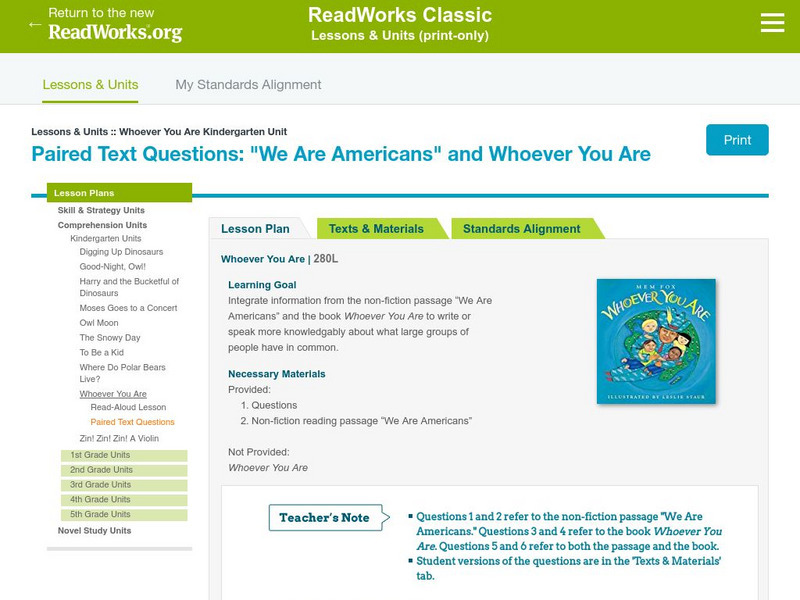Curated OER
Creating a Children's Book
Students create a studenT book following an introduction to the publication process. Through exposure to several sources, students learn the steps involved in publishing a book.
Curated OER
Language Arts: Take Me to the Hall of Fame
Students write persuasive letters supporting a trip to the Baseball Hall of Fame. Once they have written the letter, they respond to it from the coach's point of view. In addition, students compose various conclusions to their letters.
Curated OER
Year of the Impossible Goodbyes by Sook Nyul Choi
Students analyze Korean culture from their literature piece. They investigate the theme of oppression by an occupying army. Students encounter courage, resistance movements and explore the underground railroads.
Curated OER
Roughing It in the Backwoods
Students discuss the differences between living during the mid-19th century and today and then debate which would be better.
Curated OER
Farm Animals
First graders conduct research about farm animals and what it is like to live on a farm. They explore a variety of websites and complete an online WebQuest. They select a farm animal, and write a report about their animal's...
Curated OER
What Was It Like To Live in Tudor Times?
Students compare and contrast the lives of the rich and poor people in Tudor times. Students observe photographs of Tudor life. They investigate word clues describing the lives of the people. Students create a presentation on their...
Curated OER
People and Places in Indiana's Underground Railroad
Fourth graders use an Indiana map to explain why Indiana's geographic location was important to its role in the UGR. They experience personal stories and feelings of the people involved in UGR through role-play and literature.
Curated OER
Exploring the Neighborhood -- Literature Jigsaw
Students compare and contrast domesticated animals and wild animals. They identify plants and animals that have adapted to different habitats. They discover it is everyone's responsibility to protect the environment.
Curated OER
Africa
Second graders explore Africa. They label the popular places in Africa on a map. Students label the different cities and monuments that are popular in Africa. They discuss the similarities and differences between cities in Africa and...
Curated OER
I Know an Old Lady Who Swallowed a Pie
Students listen to the story I Know an Old Lady Who Swallowed a Pie. They predict what will happen next as they listen to the story. They sequence pictures and words to desribe a story.
Curated OER
Using Scholastic News to Introduce the Net
Third graders log on to the net, type in the address for Scholastic and browse the subjects for the week. They select one area of interest and generate five interesting facts about the article.
Curated OER
Memories
Fifth graders collect artifacts of their fifth grade school year and make a technology based Memory Book.
Curated OER
Earth Day
Third graders utilize technology to access, analyze, interpret and communicate information about Earth Day.
Curated OER
Words to Warm the Winter: Keeping Things Organized
Fifth graders are in Literary Circles according to the book they've chosen and choose roles.
Curated OER
Language Arts: Survival Diaries
High schoolers are able to compose a dialectical journal entry which analyzes information presented in a text. They are able to compose a creative journal entry which develops characters, presents events in logical order, and includes...
South Carolina Educational Television
Know It All: Non Fiction Text Features
Fifth graders will use non-fiction books to identify and explain how text features help them as individual readers.
Read Works
Read Works: Explicit Information 3rd Grade Unit
[Free Registration/Login Required] A two-lesson unit in which students learn how to identify explicit information in non-fiction text by creating questions and then reading the text to find answers. Students also use explicit information...
Read Works
Read Works: Cause and Effect 3rd Grade Unit
[Free Registration/Login Required] A three-instructional activity unit on cause and effect. Learners learn to use signal words to identify cause and effect relationships and to describe possible effects when given a cause in fiction....
Read Works
Read Works: Read Aloud Lesson: Digging Up Dinosaurs
[Free Registration/Login Required] Teachers will read "Digging Up Dinosaurs" using the close reading technique. Young scholars will use graphic organizers to summarize the steps necessary to collect, study, and build a dinosaur skeleton.
Read Works
Read Works: Fact and Opinion 1st Grade Unit
[Free Registration/Login Required] A three-lesson unit on fact and opinion through which students learn how to identify opinions through signal words, identify facts in a non-fiction text, and use facts to help them formulate opinions of...
ReadWriteThink
Read Write Think: Text Features: Non Fiction [Pdf]
Compare the printed page to an electronic web page and use this activity to discuss the similarities and differences. A cross-curricular tie-in with ecosystems. Could easily be adapted to another subject area.
CommonLit
Common Lit: Units: Teaching Units
Complete teaching units (12) by grade level. CommonLit units are crafted to be both engaging and rigorous, featuring a variety of literary and informational texts from diverse sources. Reading, writing, and discussion are prioritized in...
ReadWriteThink
Read Write Think: Abc Bookmaking Builds Vocabulary in the Content Areas
Six 50-minute lessons build vocabulary through the content areas by making an ABC book. It can become a classroom resource. Links include a non-fiction book list, checklist, word list, rubric, and a storyboard chart. There is also a link...
Read Works
Read Works: Paired Text Questions: "We Are Americans" and "Whoever You Are"
Students will compare information from the non-fiction book "We are Americans" and the book "Whoever You Are" to write or speak more knowledgeably about what large groups of people have in common.













